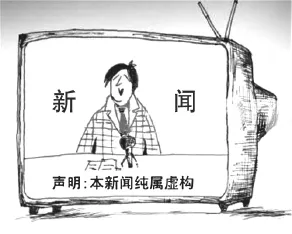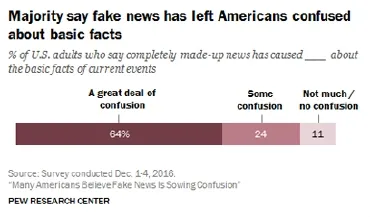多数美国人认为假新闻在制造混乱
2017-04-10来源皮尤研究中心
来源/ 皮尤研究中心
编译/ 赵瑜 浙江大学传媒学院教授
多数美国人认为假新闻在制造混乱
来源/ 皮尤研究中心
编译/ 赵瑜 浙江大学传媒学院教授
皮尤研究中心的一项最新调查显示,大多数美国人怀疑假新闻会产生影响。在三名美国成年人中,大约有三分之二的美国成年人(64%)说编造的新闻故事会对当前的问题和事件的基本事实造成很大的混乱。这种共同感受广泛地来自于收入、教育水平、党派背景和其他人口统计学特征的人们中。这些结果来自于2016年12月1日至4日进行的对1002名美国成年人的调查。
美国人普遍对自己识别假新闻的能力很有信心
虽然美国人知道假新闻造成了很大的混乱,但大多数人对自己识别一个几乎完全是编造的新闻故事的能力有信心。十分之四的人(39%)非常自信,而另外45%的人有点自信。只有9%的人不是特别自信,6%的人完全不自信。
大约三分之一的人说他们经常在网上看到假的政治新闻
近三分之一的美国成年人(32%)说他们经常在网上看到虚假的政治新闻,39%的人说有时候会看到这样的新闻,26%的人说几乎没有看到过或完全没有看到过。在一个罕见的人口统计学差异的例子中,白人比黑人和拉美裔人更倾向于说他们经常看到假新闻,而那些年薪大于等于75000美元的人比那些年薪不到75000美元的人说看到假新闻的可能性更大。
近四分之一的美国人说他们在网上分享过虚假政治新闻
一些美国人说他们直接通过分享自己的消息来传播虚假新闻。大约有四分之一的人(23%)说他们曾经分享过这样的故事,而大约有相同比例的人说他们在知情和不知情的情况下分享了新闻。

社交媒体、政治家和公众都被呼吁来帮助阻止传播编造的新闻
如果假消息的传播是一个问题,那么谁来承担解决的责任呢?在总统选举后的一个月,社交网站和搜索引擎已经采取措施来解决这个问题,同时也呼吁政府和公众本身采取行动。
According to a new survey by Pew Research Center, most Americans suspect that made-up news is having an impact. About two-in-three U.S. adults (64%) say fabricated news stories cause a great deal of confusion about the basic facts of current issues and events. This sense is shared widely across incomes, education levels, partisan affiliations and most other demographic characteristics. These results come from a survey of 1,002 U.S. adults conducted from Dec. 1 to 4, 2016.

Americans generally confident in their ability to identify fake news
Although Americans see fake news as causing a great deal of confusion in general, most are at least somewhat confident in their own ability to identify when a news story is almost completely made up. About four-in-ten (39%) are very confident, while another 45% are somewhat confident. Only 9% are not very confident, and 6% are not at all confident.
About a third say they often see fake political news online
Nearly one-in-three U.S. adults (32%) say they often see fake political news online, while 39% sometimes see such stories and 26% hardly ever or never do. In a rare instance of demographic differences, whites are more likely than blacks and Hispanics to say they often see fake news, and those with annual incomes of at least $75,000 are more likely than those who make less than $75,000 to say so.
Nearly a quarter of Americans say they have shared fake political news online
Some Americans say they have contributed directly to the distribution of fake news by sharing it themselves. About a quarter (23%) say they have ever shared such stories, while roughly equal portions say they have shared made-up news knowingly and unknowingly.
Social media, politicians and the public all called upon to help prevent spread of made-up news
If the spread of fake news is a problem, who bears responsibility for addressing it? In the month since the presidential election, social networking sites and search engines have taken steps to address the issue. And there have been calls for the government and the public itself to take action as well.
Many Americans Believe Fake News Is Sowing Confusion
From:PewResearch Center
